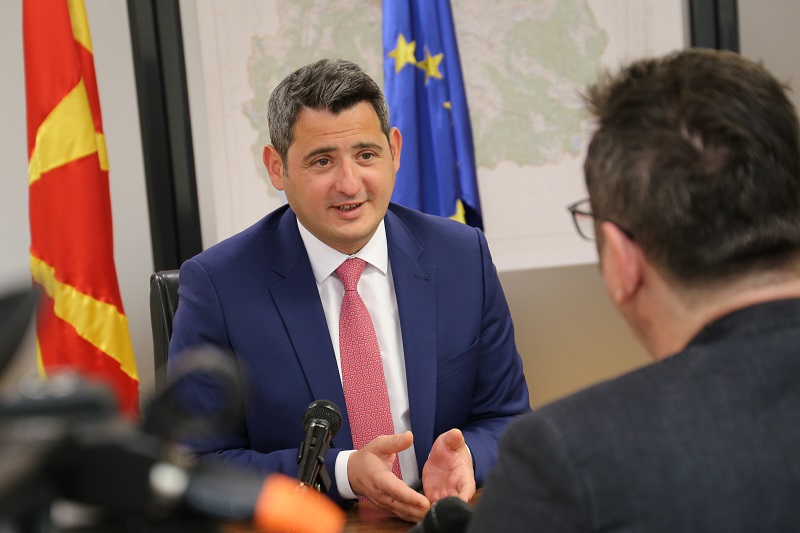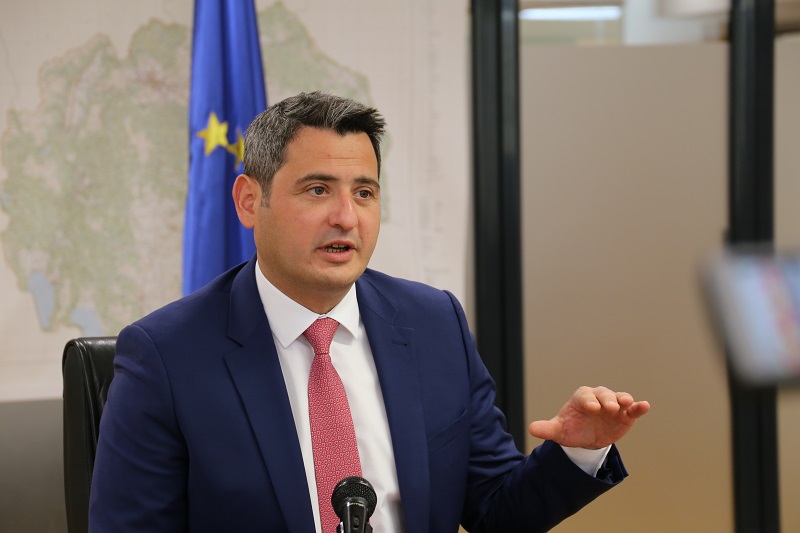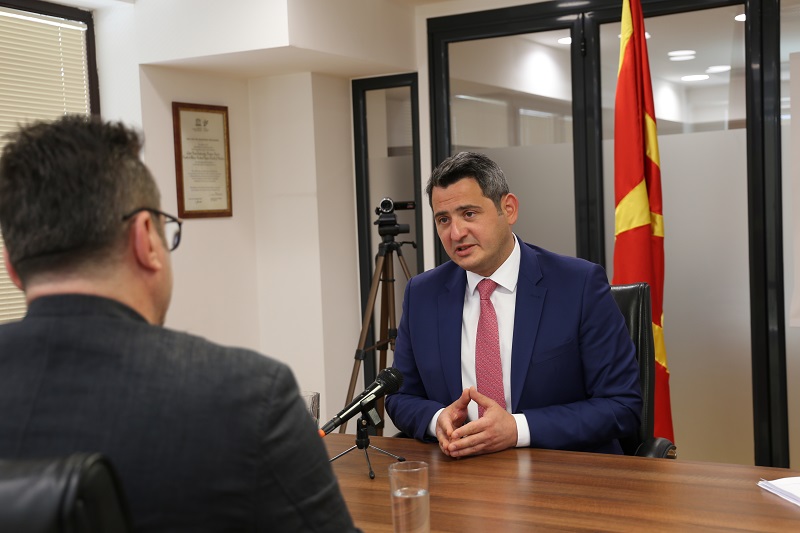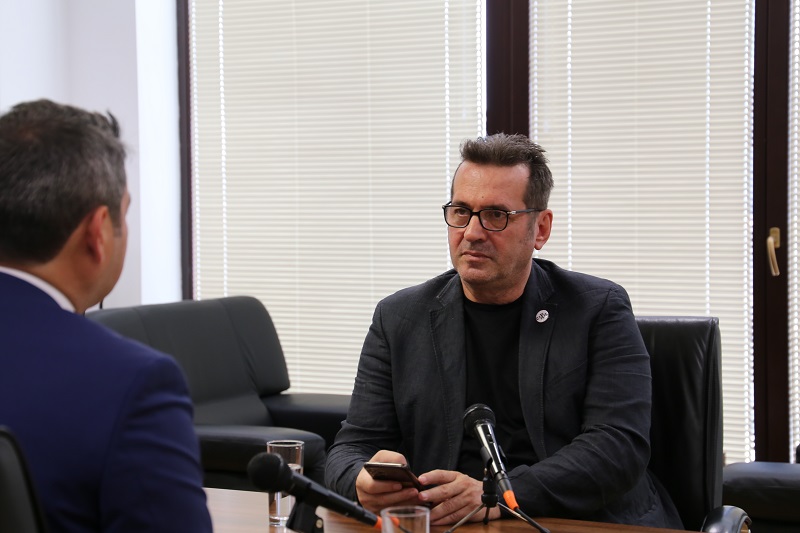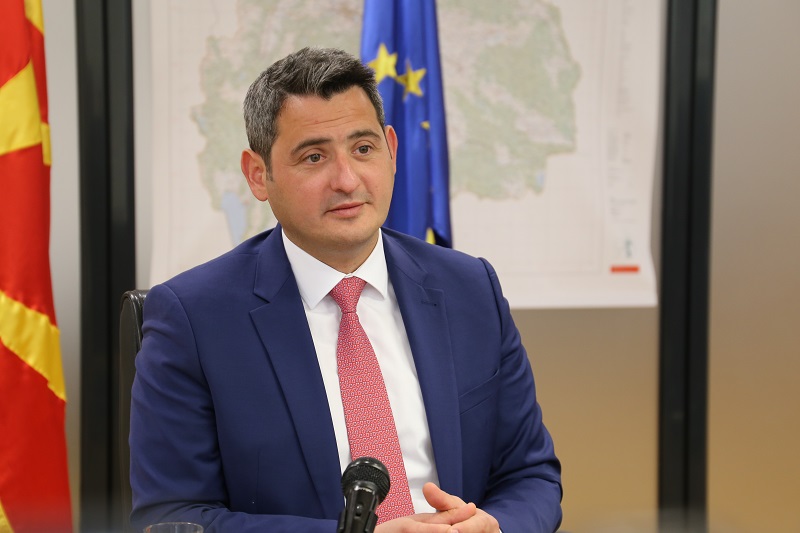On June 15, CIVIL conducted an in-depth interview with North Macedonia Minister of Environment and Physical Planning, Naser Nuredini.
According to his official biography, Nuredini was born in Tetovo in 1979 and received his primary education in Macedonia, going on to study in Austria, Germany and Great Britain. Nuredini also holds Austrian citizenship. He is married and is father of one.
Nuredini has worked as an analyst for B.P. Invest Consult in Vienna and Caib International Markets Ltd in London, Unicredit Bank in London as a director for investments for listed financial companies and real estate in Eastern Europe, and as an independent advisor focusing on Mergers and Acquisitions. As an analyst, he participated in privatization with investments and advisory activities for governments in Southeast Europe.
Nuredini has also done charity work and staged art exhibitions. He speaks English, German and Italian, as well as Albanian and Macedonian.
CIVIL spoke to Mr. Nuredini on issues related to green politics in the country and in general, finding out that his views and plans are not only theoretical, but practical and to the point. Unlike a typical Balkan politician, Mr. Nuredini is not afraid to point out a failure or a delay in accomplishments, providing solid arguments and facts on all questions tackled during the conversation. Despite the enormous challenges Nuredini faces and is aware of, we discovered that Mr. Nuredini is an optimist in solving the most burning issues related to the country’s green agenda. Another specific finding is that Mr. Nuredini is prone to put the responsibility, all of it, on the government’s shoulders, and never on citizens.
My first question is about green politics. Do you find our country a good space for green politics? Do you think that our country has the capacity to actually understand and implement green policies and practices?
NUREDINI: First of all, thank you very much for giving me the opportunity to speak to you and especially talk about the topic which is very important I think, and which is being used very often in the media, or by people actually involved in politics.
When we speak about green politics and the green agenda, we need to be first of all aware where it comes from. So, the green agenda is an international agreement between certain large industrialized states, first of all it’s the EU, Western Balkan Green Agenda, so they are actually also asking us to align ourselves with the future more sustainable world. When we actually talk about the green agenda, we also need to inform our citizens what it means.
So, what does the green agenda mean? Are we going to greenwash everything, as the saying goes? The idea of a green agenda is very simple and straightforward: To have a more sustainable future. Now, are we going to speak about the infrastructure or is it the other level of climate change that we need to look at? When we speak about infrastructure, what we need to inform our citizens is that the green agenda means that we are trying to build a sustainable infrastructure for them. Meaning that they all have clean drinking water, that all the waste waters get properly treated, we do not pollute our rivers, which we also use for agriculture, that we collect the waste properly, that we do not discard it everywhere on the fields, that we have the appropriate land landfill management system, that we have the appropriate selection system, that we have the cleaner environment for tomorrow, that waste does not mean waste, but actually it’s a raw material in all the cases…
So, this is something we would actually be more proactive about with our citizens and in our country. Do we have the potential? Absolutely. Look around. We have some of the most beautiful mountains in the region, in Europe even. The Balkan green belt, as is called, has one of the richest biodiversity in Europe. This is why one of the policies of this government and mine has been to protect our nature and to use it in a sustainable way. To create an economy out of it. That’s the green agenda!
Create an economy out of using our natural resources in a sustainable way. People would love to come and see our mountains, that’s why we have a new national park in Sharr Mountains. This is why we are working on the Malashevo and the Osogovo mountain ranges. The potential is endless. Green agenda does not mean more costs. If anything, it means a better future for us, our children and our grandchildren.
 Is there an understanding in the country, among citizens, in the society, in the media? Do they understand the green agenda?
Is there an understanding in the country, among citizens, in the society, in the media? Do they understand the green agenda?
NUREDINI: I think our citizens understand it, we just need to be able to express ourselves better. And we need to actually do more. All of us need to do more.
When I say more, I’m talking about the institutions, it means the plans that we have in place. Now I’m going to choose one of them and I’m going to speak about, for example, energy efficiency, which is actually part of the green agenda.
Now, climate change is happening, unfortunately. I think people are beginning to see the fact that we have a lot of floods unfortunately. And it’s happening because of the drastic weather changes. In the past, we haven’t had as many. This is actually due to climate change.
When I say energy efficiency, citizens understand that. It means that we invest in our home to make it more energy efficient so I spend less on energy. So, the citizens understand that. The politicians also do.
That leads me to the second question actually. To reinvest in homes, in people’s homes, is an expensive “toy”. Actually, the whole agenda seems to be kind of an expensive “toy” for both the institutions and even more for the taxpayers of the country. Of any country, not only our country.
NUREDINI: It isn’t though. When we actually look at the costs that we are going to have tomorrow if we don’t invest today, you see this is not a cost today, it is an investment for the future.
But you don’t have the money now.
NUREDINI: This is why the state is actually subsidizing a lot and supporting this. We have different programs, where we subsidize up to 20% as a state. Or whether someone wants to get a loan, there are programs from the global environment foundation, there are little banks where they also subsidize 15-20 percent.
So, the support is there, and it is costly as you said, however, this is an investment for the future, because if you can have a more efficient energy heating system at home, I still call it investment because it is an investment, and will be returned within four to five years.
So, it’s even mid-term, not even long-term?
NUREDINI: No, it’s not long-term. Absolutely not. If our houses, if we are heating our homes over winter, and if it’s not isolated properly, we are going to spend a lot more. If we invest in heat pumps for example, which are very, very energy efficient. Studies, actually people, tell me that it actually cuts the cost by half or even more.
 Considering the global situation, not only the environment, but also the political, military, security and so on, do you see, or can you name couple of highest priorities and maybe the biggest challenges that you are facing, as a minister, and all of us, as a society versus all the other challenges of the modern world?
Considering the global situation, not only the environment, but also the political, military, security and so on, do you see, or can you name couple of highest priorities and maybe the biggest challenges that you are facing, as a minister, and all of us, as a society versus all the other challenges of the modern world?
NUREDINI: There’s two aspects of that. First of all, unfortunately, we had the pandemic. To start with that. The pandemic was a warning. It actually was the best stress test, which you usually do on banks, on the financial system, you do a stress test, but the pandemic actually was a stress across the whole board, on private sector, institutions, administration, etc. And in challenging times, you are supposed to learn something out of things.
Then came the unfortunate war in Ukraine. And the energy crisis, which gave us a second warning. The fact that our supply chains are way too long, we are too dependent on certain individual sources. So, now we are facing an energy crisis, because of a conflict, the war that is happening in Ukraine. And the whole of Europe is facing it, and especially the Balkans, which usually have lower energy prices compared to the Europeans of course. So, the biggest challenge is the fact that we are very dependent on the natural gas that flows from Russia.
So, the key project for us is to diversify our source of natural gas. That’s why we have been investing heavily in the network. That’s why we are currently investing in the Alexandropoulos energy port. That’s why we are investing in the interconnector with Greece.
Do you think that will be sufficient for this winter [2022-2023]?
NUREDINI: Unfortunately, the interconnector is not going to be built by this winter. However, we are working with our neighbors, Bulgaria, so that we also get the natural gas from another source that they are getting themselves. These are the key challenges when we are speaking about internationally.
Locally, though, when we speak about local challenges of environment protection, the key challenges are unfortunately that over the last 30 years. Our state, unfortunately, did not invest a lot in infrastructure and the environment. Pick one.
Let’s pick waste management. For 30 years, it has been decentralized on a local self-government level. They are the ones obliged to deal with waste management. For thirty years, they have not been able to build the infrastructure. The appropriate infrastructure. That’s why my policy, when I came, was to have new laws, new obligations, new responsibilities, also from producers. And at the same time to try to find the funding and the financing structure to invest in the infrastructure.
Because, it is very obvious that municipalities do not have the financial capability to invest in landfills, transfer stations and buy new vehicles. So, we put it in the government, we pass it in the government, we take out a loan, and we will build the infrastructure in the country. These are the investments that are needed. The wastewater treatment plants, too.
 So, you put the responsibilities first on the government shoulder, and not on the citizens’ part.
So, you put the responsibilities first on the government shoulder, and not on the citizens’ part.
NUREDINI: No. You cannot put it on the citizens, because we are here to govern, to make the changes. We are supposed to take the first steps. It’s not the citizens.
Is the environmental awareness, the level of environmental awareness a challenge for you?
NUREDINI: I don’t think that we don’t have the awareness. I think that the majority of citizens are actually aware of it. Of course, there are going to be some that are not, but the question is again what I said earlier: Have we as a state, and I’m not saying the government, but the state, because a state is governed by different governments over time… Have we invested in an infrastructure to give the citizens the opportunity to dispose of waste appropriately? Have we given the opportunity to our citizens to select their waste in the past? Not sufficiently.
This is why we are actually working on new laws, we are going to buy the infrastructure, we are going to buy the containers, separation waste, we are going to work together with the private sector, because they are the ones producing the packaging that ends up being waste. So, every time you buy something, in reality, at the same time you are buying waste. Because the packaging at the end ends in the bin. But we want to be able to give our citizens the opportunity to go to the containers, separate plastic, cans, paper and the rest of the waste, for example.
How far is that operation? I don’t think we can see a lot of selection going on.
NUREDINI: Unfortunately, things have not happened as I foresaw them when I first arrived, or as the government had been planning. We’ve gone through the pandemic, we’ve gone through a crisis, an energy crisis, and now there’s also the food issue. But this year we’re starting. The law is in the parliament. We are expecting the law to be passed very soon.
I don’t think there is any single member in parliament who wants to block such an important project, when we’re speaking about having a cleaner environment, and finally solving the issue of waste management. Second of all, we also now have funds from the plastic bags that we introduced a fee on, because the idea was the polluter-pays principle. Because, plastic bags pollute our soil. And they are there for hundreds of years. Then it pollutes the underground water we drink from.
From that we got about 750.000 euros, which we will return back to the citizens, because we will be buying these containers for our citizens. And then it’s going to be our turn, as citizens to start selecting our waste.
If I were you I wouldn’t be too optimistic. When we speak about our problems and our politicians, you might encounter some obstacles and blockades, but let’s be hopeful of course.
NUREDINI: I think it would be a shame if anybody blocks projects that are to the interests of citizens. It’s that simple. I don’t see why this would be blocked. It’s never been anything against it, these projects have been worked with the international community, with international banks. I don’t think any member of parliament should be against such a project.
I support your optimism, but I would be cautious anyway.
NUREDINI: I’m an optimist.
However, you actually answered my questions, through mentioning projects. Is there any other project that you are running at the moment?
NUREDINI: There’s actually quite a few. Unfortunately, some of them have had delays, due to the situation with the pandemic. We need to do environmental impact assessment studies for every project that we start if there is a large infrastructure, and we want to respect the laws that we have and the international community regulations and standards. The largest one we are going to speak about is the wastewater treatment plant in Skopje. We will start very soon, hopefully.
The evaluation is underway, the company will be selected, hopefully working on the wastewater treatment plant in Skopje might start by the end of the year. We currently have funds from the European Union, through the IPA projects. We are also working on wastewater treatment plants for Bitola and Tetovo. Hopefully, we will be starting the tendering procedures on those as well.
Furthermore, we are also working in the northeast and east region, also through IPA funds, for the waste management in those two regions. There are a lot of smaller projects we are working on. We are taking a loan for a drinking water and wastewater network, as well. Other projects are mainly on environmental protection and creating a sustainable industry out of that.
There’s a lot on your plate. I believe that it’s very expensive to run and implement all these projects. Are you optimistic that in a situation of a world crisis, also including an economic one, apart from the security one, that you will actually get all those funds needed for this?
NUREDINI: For the projects I just mentioned, we have secured the funding.
Already!
NUREDINI: The funding has been secured. This has all been in the works in the last two years. This is not something we are starting now. We have been working on this in the last three years. Now, we are hoping to start executing these projects. And if we are speaking about an economic crisis, this is the best way to support our economy. Investing is, as we like to say, a green investment. All these investments I am speaking about are going to protect the environment. At the same time, these investments are going to be creating new jobs. Because these are larger infrastructure projects. And, furthermore, they will be creating jobs and using material that is locally produced, as well. So, there is going to be a ripple effect in our economy. The sooner we start with this, the better it is for our country, because we will be able to support the economy.
 Well, I hope that this part of the interview will be seen by politicians that might have some objections. However, everything you are speaking about is part of a systematic and systemic effort, which is also requiring, apart from money and intellectual capacities, also time. Do you think that frequent electoral processes go hand in hand with your plans? Of course this is a rhetorical question, but what do you think about early elections or even regular elections? How are elections affecting these kinds of projects?
Well, I hope that this part of the interview will be seen by politicians that might have some objections. However, everything you are speaking about is part of a systematic and systemic effort, which is also requiring, apart from money and intellectual capacities, also time. Do you think that frequent electoral processes go hand in hand with your plans? Of course this is a rhetorical question, but what do you think about early elections or even regular elections? How are elections affecting these kinds of projects?
NUREDINI: Unfortunately, elections create a disturbance. They create a disturbance in the system, they create a disturbance in the processes. To answer your question whether we need early elections, my answer is – of course I don’t believe that. I don’t think we need it.
What we need is, in fact, that we need to carry on working. I don’t think we need to have elections in the country every year. We need to stop having elections every year. Maybe local, then comes the parliamentary, then we have the presidential and everything else. The key is that we continue working and do not hinder these processes, because these are very large and important projects, and we need to support them. When I say these projects, I mean all of us in the country, because these are long-term projects, it is a long-term strategy and a lot of the projects we are working on, when I speak about the environment, they are not political.
These are long-term projects. When we speak about the energy strategy, which we haven’t opened yet, this is long-term. That’s why it’s not going to be today that we are going to start building Chebren, which is also in the final phases of the evaluation. As of July, we are going to expect offers, the second phase of the offers for Chebren.
It’s not a mandate thing. This will take seven to ten years to be built. Should be successful with the tendering, so I can assure you I won’t be the minister who’s going to be cutting the ribbons then, but I can assure you that it’s going to be part of the energy strategy of the country for the future.
 Well, what’s your very first next step after this interview?
Well, what’s your very first next step after this interview?
NUREDINI: My very next step is that I am actually sitting down with some people, experts to speak about waste management, and starting a recycling process in the country.
When can we see a really visible rise of the number of waste selection bins across the capital and across the country?
NUREDINI: I’m not looking for an excuse here, unfortunately due to the rebalance, we are not able to start the procurement of the containers. But as soon as the rebalance passes, we will start the process of procuring these containers. I’m hoping, again, I am an optimist, I’m hoping that at least by the end of the year we will be distributing these containers across the country.
Good luck to you and to us, of course. Thank you very much.
NUREDINI: Thank you.
Xhabir Deralla
camera/photo: Dehran Muratov
video-editing: Arian Mehmeti
transcript: Natasha Cvetkovska











